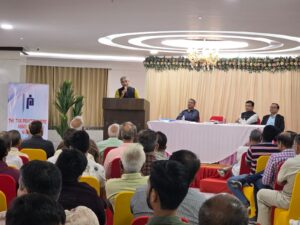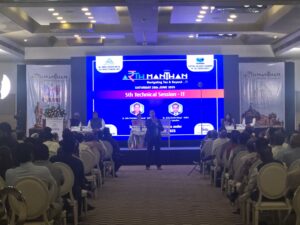GST WEEKLY UPDATE : 50/2022-23 (12.03.2023) By CA Vipul Khandhar

-By CA Vipul Khandhar
1. Mandatory reporting of 6 digit HSN codes as per Notification No. 78/2020 – Central Tax dated 15/10/2020: Advisory for e Invoice:
As per the Notification No. 78/2020 – Central Tax dated 15th October, 2020, it is mandatory for the taxpayers to mention 6-digit HSN Codes for their outward supplies having AATO more than Rs.5 Crores.
After a few weeks of time, e-Invoice System will not accept 4-digit HSN codes. The date for blocking e-Invoice generation having HSN code as 4-digits will be intimated shortly in this portal. So, please make necessary changes in your system to report 6-digit HSN codes to e-Invoice Portal and comply by the notification. You may verify all your HSN codes in the (https://einvoice1.gst. gov.in) portal under Search–>Master–>HSN Codes and also test in the sandbox system (https://einv-apisandbox.nic.in ). In case the 6 digit HSN code is not available, you may raise a ticket at Helpdesk so that it can be included in the system.
2. GSTN enabled option to utilize the amount in Cash Ledger of one GSTIN by another GSTIN having same PAN:
The Goods and Services Tax Network (“GSTN”) has enabled the option to utilize the amount in the cash ledger of one the Goods and Services Tax Identification Number (“GSTIN”) by another GSTIN (entities having the same PAN) by way of transfer through form GST PMT-09 has been made effective in the GST portal.
Relevant Provision:
Rule 87(14) of the Central Goods and Services Tax Rules, 2017 (“the CGST Rules”)
Electronic Cash Ledger –
(14) A registered person may, on the common portal, transfer any amount of tax, interest, penalty, fee or any other amount available in the electronic cash ledger under the Act to the electronic cash ledger for central tax or integrated tax of a distinct person as specified in sub-section (4) or, as the case may be, sub-section (5) of section 25, in FORM GST PMT- 09:
Provided that no such transfer shall be allowed if the said registered person has any unpaid liability in his electronic liability register.
Ignorantia juris non-excusat: the general defense is extended only to persons who have acted on an error of fact that they are bound by law or justified by law in doing that act.
The maxim ignorantia juris non excusat originated from ancient Roman law and it means that ignorance of a law or a lack of knowledge of laws is not an excuse in a court of law. It implies that the court presumes that every party is aware of the law of the land and therefore, precludes them from claiming ignorance of the law as a defense to escape liability. This maxim is based on the notion of legal literacy that every individual must know their rights and duties. This maxim is a legal fiction that is created out of necessity for if the maxim is relaxed, then any defendant can claim that he had no knowledge of the law on his part. Therefore, it will be almost impossible for the prosecution to prove the offence. Ignorentia facti doth excusat is another maxim that is closely related to this and it provides that ignorance of a fact is a ground for excuse while fixing the liability of a person.
These principles are incorporated in Indian Penal code through Section 76 and Section 79. Section 76 provides that nothing is an offence which is done by a person who is, or who by reason of a mistake of fact and not by reason of a mistake of law in good faith believes himself to be, bound by law to do it. Section 79 provides that nothing is an offence which is done by a person who by an error of fact and not by mistake of law in good faith believes himself to be justified by law, in doing it. Thus, it can be seen that the law provides general defense to a party who does an act in good faith even when he is acting on a mistake of fact. But the same protection is not accorded to a person who acts on a mistaken belief of law or knowledge of law. In these two sections, the general defense is extended only to persons who have acted on an error of fact that they are bound by law or justified by law in doing that act.
- AAR & Judicial Decisions:
(i) Decision of Hon’ble Highcourt of Gujarat Regarding Reversal of ITC at midnight during search and seizure can’t be voluntary payment of GST dues:
(Applicant – M/s. Shree Ganesh Molasses Trading Limited)
The petitioner alleged that on February 11, 2022, a search and seizure operation was carried out by a team of CGST officials. On February 12, 2022, tax officials reversed the ITC in the electronic credit ledge and corrosively and illegally filed Form DRC03 under Section 74(5), although it was not voluntary. According to the petitioner, there is no tax evasion on the part of the petitioner firm and there arises no question of admitting any wrongdoing.
Tax Department denied that any pressure was put on the petitioner to pay any kind of deposit. The statement of one of the partners on February 11-12, had been recorded and he had signed on each page and it cannot be said that he was threatened or force.
During the hearing, the lawyer for the petitioner reproduced an instruction dated May 22, 2022. It clarified that there may not be any circumstance necessitating ‘recovery’ of tax dues during the course of search or inspection or investigation proceedings. However, there is also no bar on the taxpayers for voluntarily making the payments on the basis of ascertainment of their liability on non-payment/ short payment of taxes before or at any stage of such proceedings. The tax officer should, however, inform the taxpayers regarding the provisions of voluntary tax payments through DRC-03, the instruction said.
Instruction not followed
After going through all the facts presented and arguments made by both parties, the court felt that said instruction has not been followed. Accordingly, it held that the tax department is required to reverse the ITC along with interest.
(ii) Hon’ble Allahabad Highcourt Decision Regarding GST amount to be adjusted if there is an issue of mismatch in GST Return with Bank Statement:
(Applicant – Vriddhi Infratech India Pvt. Ltd)
Allahabad Highcourt has set aside the order passed by the Revenue Department, on the grounds, that the Revenue Department and the Appellate Authority have committed the misreading of FORM GSTR-09 filed by the assessee. Directed the Revenue Department to adjust the GST amount deposited by the Petitioner.
The Hon’ble Allahabad High Court in Writ Tax No. – 4 held as under:
- Observed that, the Respondent and the Appellate Authority have committed the misreading of FORM GSTR-09.
- Directed the Respondent to adjust the GST amount deposited by the Petitioner in the F.Y. 2018-19.
- Directed the Respondent to release the security amount deposited under the interim order.
- Set aside the OIO and the OIA.
(iii)Decision of Hon’ble Highcourt of Gujarat Regarding Reversal of ITC at midnight during search and seizure can’t be voluntary payment of GST dues:
(Applicant – Mobile Shoppe)
Gujarat High Court held that in case there is any doubt with regard to export of goods, then, Customs Authority needs to take up the issue and not GST Authority. Facts- The petitioner is engaged in export of Mobile Phones.
The petitioner buys the mobile phones through its sister concerned M/s. Anjalli Enterprise, which instructs the vendor to deliver the mobile phones directly to the airports for the purpose of export by M/s. Mobile Shop i.e. the present petitioner. The vendor raises the invoice in the name of M/s. Anjali Enterprise in accordance with the instructions, but generates e-way bill with delivery address mentioned as the airport. Both such invoice and e-way bill accompany movement of the right up to the airport. M/s. Anjali Enterprises raises invoices on the petitioner for sale of mobile phones and the petitioner thereafter, files the shipping bills and export the goods after due clearance by the customs authorities. On 31.07.2020, the search proceedings were conducted by the respondent authorities under the CGST Act at the premise of the petitioner. The petitioner explained the modus operandi of its business. The query was raised regarding refund claimed by the petitioner on export. The respondent also demanded the e-way bills in respect of purchases. The second e-way bill was insisted by the respondent in respect of purchases made by the petitioner from M/s. Anjali Enterprise and in absence thereof, it was construed as the deficiency of documents and the refund of IGST was said to be erroneous on the ground of deficiency of documents.
Disclaimer:
This publication contains information for general guidance only. It is not intended to address the circumstances of any particular individual or entity. Although the best of endeavour has been made to provide the provisions in a simpler and accurate form, there is no substitute to detailed research with regard to the specific situation of a particular individual or entity. We do not accept any responsibility for loss incurred by any person for acting or refraining to act as a result of any matter in this publication.




